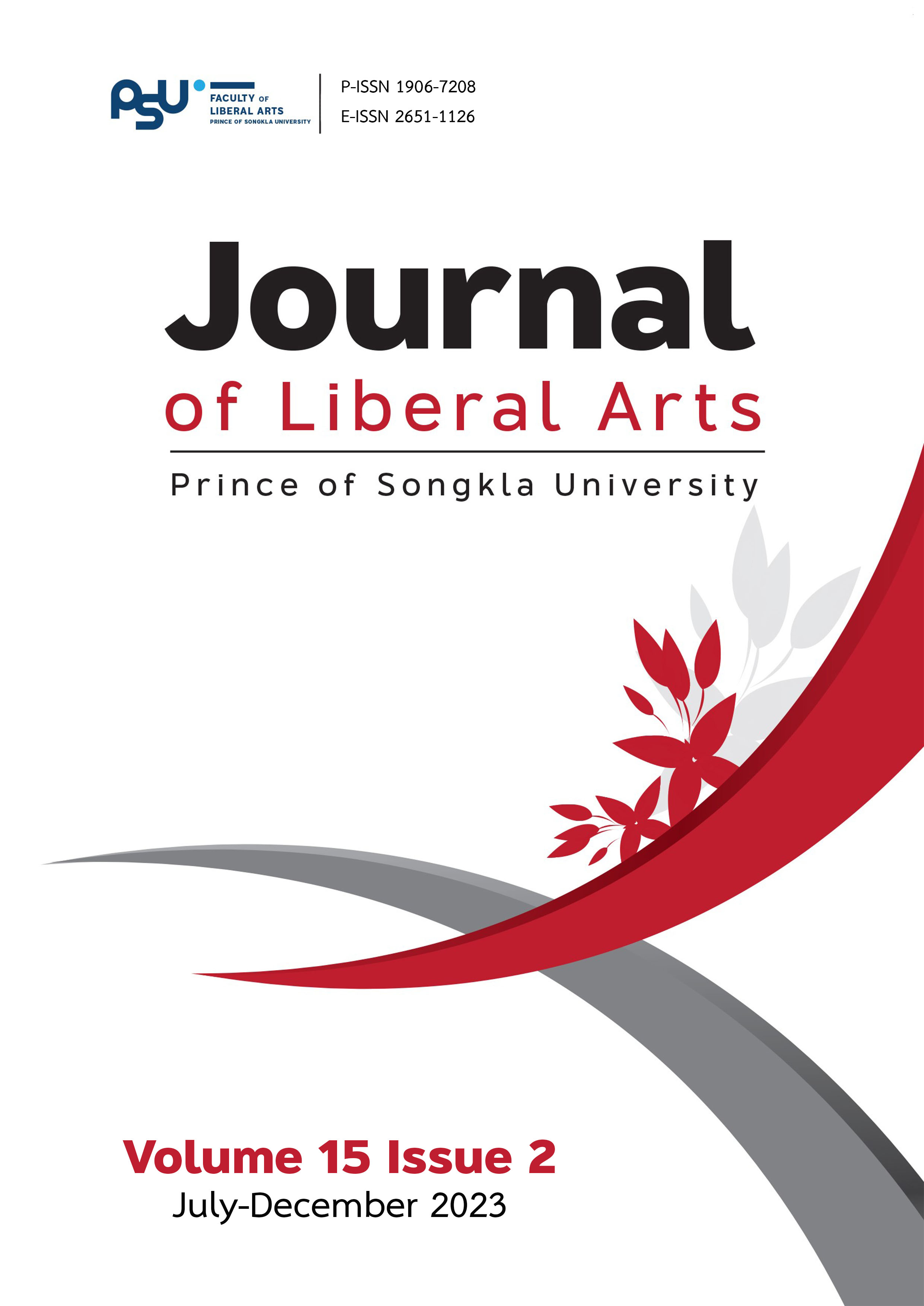Opinions Towards the Use of Reciprocal Teaching Strategy in English Reading of Thai Lower Secondary Level Students
DOI:
https://doi.org/10.14456/jlapsu.2023.16Keywords:
opinions on the use of RTS, reciprocal teaching strategy, English reading, lower secondary school studentsAbstract
Reciprocal Teaching Strategy (RTS) is an interesting strategy for reading activities which helps develop English reading abilities. This study investigated Thai lower secondary school students’ opinions on the use of RTS while reading in English. The investigation was conducted with 40 students enrolled in the eighth grade at a public school in the Huaiyot district of Trang province. The non-probability sampling method was utilized. The participants were in an intact class which was an already-formed group with a similar English proficiency level. Quantitative data were collected through opinion questionnaires and calculated with means and standard deviations. Qualitative data were obtained from open-ended questions in the questionnaires, interviews, and the teacher’s logs. It was found that most students agreed with the use of the reciprocal teaching strategy in English reading; that is, they had positive opinions on using RTS stages of predicting, questioning, clarifying, and summarizing and the exchange of leading roles in a discussion group. It can be inferred from the findings that RTS can be an engaging tool in a reading class and can enhance students' inspiration to improve their English reading skills and to develop more positive attitudes when reading texts in English.
References
Adunyarittigun, D. (1999). Reciprocal teaching: A new chapter for EFL reading instruction. Thoughts, 1999(1), 142-150.
Allen, S. (2003). An analytic comparison of three models of reading strategy instruction. IRAL, 41, 319-338.
Chomchaiya, C. (2014). An investigation into the development of English language reading comprehension among Thai undergraduate students using an online blended learning approach (Doctoral dissertation, Curtin University).
Cotterall, S. (1990). Developing reading strategies through small-group interaction. RELC Journal, 21, 55-69.
Fahas, R. (2021). Improving the students’ reading comprehension through request (reciprocal question) strategy for Indonesian junior high school. SALEE: Study of Applied Linguistics and English Education, 2(1), 37-50. https://doi.org/10.35961/salee.v2i01.217
Ghorbani, M.R., Ardeshir Gangeraj, A., & Zahed Alavi, S. (2013). Reciprocal teaching of comprehension strategies improves EFL learners’ writing ability. Current Issues in Education, 16(1), 1-13.
Kongkerd, W. (2013). Teaching English in the era of English used as a lingua franca in Thailand. Executive Journal, 33(4), 3-12.
Meyer, K. (2010). 'Diving into reading': revisiting reciprocal teaching in the middle years. Literacy Learning: the middle years, 18(1), 41-52.
Office of the Education Council. (2017). Education in Thailand. Prigwan Graphic Co., Ltd.
Palincsar, A. S. (2013). Reciprocal teaching. In J. Hattie & E. M. Anderma (Eds.), International guide to student achievement (pp. 369-371). Routledge.
Palinscar, A. S., & Brown, A. L. (1984). Reciprocal teaching of comprehension-fostering and comprehension-monitoring activities. Cognition and instruction, 1(2), 117-175.
Sawangsamutchai, Y., & Rattanavich, S. (2016). A comparison of seventh grade Thai students' reading comprehension and motivation to read English through applied instruction based on the genre-based approach and the teacher's manual. English Language Teaching, 9(4), 54-63.
Soranastastaporn, S., & Ratanakul, S. (2000). An experimental study of the use of grammar translation and the reciprocal teaching technique in teaching English reading comprehension. SLLA Studies in Language and Language teaching, 9, 1-17.
Ramadan, O. A. (2017). The impact of reciprocal teaching strategies on the learners reading comprehension, strategy use and attitudes (Doctoral dissertation, Birzeit University). Birzeit University
Rawengwan, W., & Yawiloeng, R. (2020). Reciprocal teaching method for enhancing Thai EFL learners’ reading comprehension ability. Sripatum Review of Humanities and Social Sciences, 20(1), 105-123.
Tamrackitkun, K. (2010). Extensive reading: An empirical study of its effects on EFL Thai students’ reading comprehension, reading fluency and attitudes. University of Salford (United Kingdom).
Tolongtong, N., & Adunyarittigun, D. (2020). The reciprocal teaching procedure: An alternative reading instruction that works. Journal of Studies in the English Language, 15(2), 27-62.
Uraiman, Y. (2011). Developing secondary school students' reading ability and motivation using an extensive reading program (Doctoral dissertation, Srinakharinwirot University). Srinakharinwirot University
Wibisono, M., Ivone, F. M., & Irawati, E. (2019). Integrating Reciprocal Teaching and Edmodo to Improve the Students’ Reading Comprehension for Eleventh Graders. Jurnal Pendidikan Humaniora, 7(1), 16-25.
Wibowo, Y. E. W., Syafrizal, S., & Syafryadin, S. (2020). An analysis of English teachers' strategies in teaching reading comprehension. Journal of Applied Linguistics and Literacy, 4(1), 20-27.
Downloads
Published
How to Cite
Issue
Section
License
Copyright (c) 2023 Apisara Kaewsuan, Nisakorn Charumanee

This work is licensed under a Creative Commons Attribution-NonCommercial-NoDerivatives 4.0 International License.
The authors retain the copyright to their article but the Journal of Liberal Arts, Prince of Songkla University reserves the exclusive rights to first publication.






